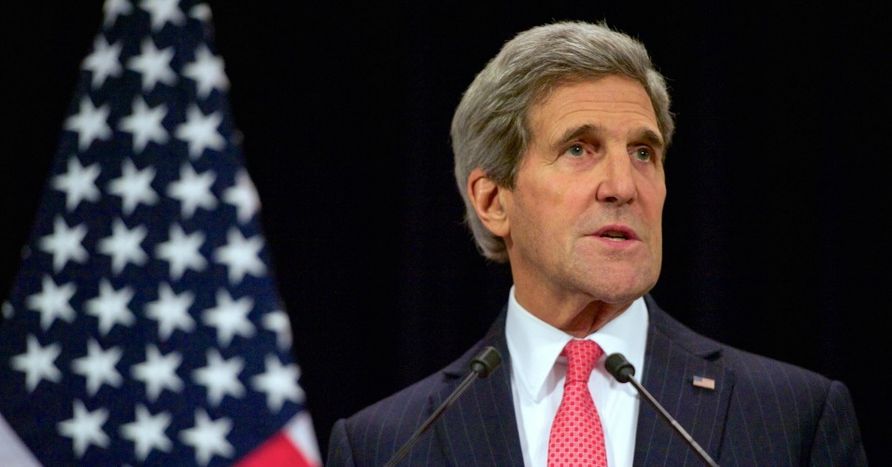
Waiting for Godot: U.S. Conceit at Climate Talks
Published on
[OPINION] The U.S. Secretary of State sees climate change as "one of the greatest economic opportunities the world has ever known". But for whom exactly?
"Waiting for Godot"...
In an amazing display of American conceit, US Secretary of State John Kerry made no mention of any reparations to developing countries suffering the effects of climate change, a subject known around COP21, the international climate summit taking place this week, as “loss and damage.” Applauding Citibank, Bank of America, Goldman Sachs and the private sector for investing in “climate projects,” Kerry admonished listeners not to sit around “waiting for Godot,” and called so-called clean energy “one of the greatest economic opportunities the world has ever known.”
His message was clear. Speaking exclusively to big business despite his location at an international conference on the northeastern outskirts of the French capital, Kerry blamed the developing world for their part in polluting the atmosphere, and largely absolved the world’s wealthiest countries from contributing to climate change. Invoking Bill Gates and the invisible hand of capitalism, he repeatedly emphasised the role of private enterprise and “the marketplace” in repairing the environment. Culminating in an unimpressive yet applause-garnering pledge of $800 million in “grant-based adaptation investments by the year 2020,” Kerry concluded that the rest of the world needs to get with the programme.
“The fact is that even if every single American citizen biked to work, carpooled to school, used only solar panels to power their homes – if we each planted a dozen trees – if we somehow eliminated all of our domestic greenhouse gas emissions – guess what? That still wouldn’t be enough to offset the carbon pollution coming from the rest of the world…. not when more than 65 percent of the world’s carbon pollution comes from the developing world…. No matter how much half the world does to clean up its act, if similar steps aren’t taken by the rest of the world, Earth still has a problem.”
A business-first sentiment
But that 65%, or 57% according to the World Resources Institute, calculation includes China and India. China is the world’s greatest emitter of greenhouse gases, but the U.S. in second place is not far behind, followed by the European Union. And neither the EPA nor the WRI distinguish between national and transnational corporate emissions, such as those resulting from the activities of U.S. headquartered fossil fuel extractors operating in developing countries.
This business-first sentiment was echoed by Sierra Club president Michael Brune in his own intervention a day earlier. Congratulating the US on a GHG reduction of 200 million tonnes from 2007-2014, Brune went on to speak about the country’s potential transition from coal. In a curious directive for an organization known for forest preservation and mountain climbing, whose motto is “explore, enjoy and protect the planet”, Brune declared that two things are essential for the transition: 1) “What comes after coal? We must make sure that clean energy follows”; and 2) “We must ensure that the transition secures jobs.”
A L&D language
The Loss and Damage (or L&D) mechanism was formally incorporated into the United Nations Framework Convention on Climate Change (UNFCCC) at COP19 in Warsaw in November 2013. According to the UNFCCC, “The aim of the L&D Mechanism is to address loss and damage associated with impacts of climate change, including extreme events (such as hurricanes, heat waves, etc.) and slow onset events (such as desertification, sea level rise, ocean acidification, etc.) in developing countries that are particularly vulnerable to the adverse effects of climate change.”
In addition to “mitigation” and “adaptation,” loss and damage is a third concept introduced at the climate negotiations to cover the effects of climate change that cannot be rectified or replaced, as when lives, be they animal or human, are lost and their habitats damaged beyond repair. Loss and damage has disproportionately affected small island developing states (SIDS) and least developed countries (LDCs), which, without much or any industry, have done little to nothing to cause it. The potential $650 billion in private sector investments Kerry hails “should the right opportunity for projects present itself” is not for loss and damage, where funding is offered with no strings attached.
Dr. Michael Dorsey, co-founder and board member of Islands First, a non-profit capacity building organization for small island nations, scoffed at “offering a 20 year note tied to power generation. Poor people don’t have any credit by definition.”
Dorsey asserts that “no one is seriously agitating for low-cost access to solar power but catering to wealthy clients. The energy conversation is weak across the board. Most are nowhere involved with avoiding a monopoly on renewables.”
Already, loss and damage language has been diluted in COP21’s draft text issued late Thursday night, reportedly due to U.S. and other countries’ objections to any implication of liability.
Kerry expressed little confidence in his speech that the 2C temperature increase limit that appears in the Dec 10 draft would be adhered to, a bare minimum or even not enough according to many experts. “One of the things that really we expect to happen here and that makes Paris so important is not that we’re going to leave here knowing that everything we’re going to do is going to hit the 2 degree mark. But what we’re doing is sending the marketplace an extraordinary signal.” As if the relentless pursuit of profit were not cited by everyone from Naomi Klein to the Pope as both contributing to and causative of our environmental destruction.



